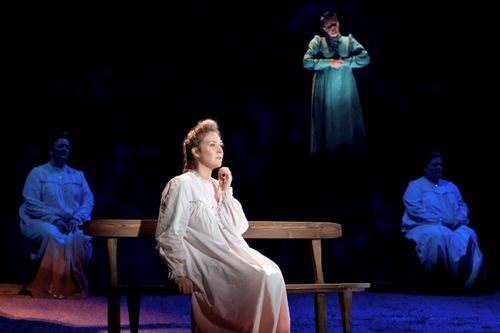Contemporary Opera: Nico Muhly’s Dark Sisters
Leela Subramaniam
12/10/2011


Walking into the dress rehearsal of Nico Muhly’s “Dark Sisters” with a few fellow contemporary ensemble singers, I have to admit that I didn’t know what the opera was about. Everyone I had asked gave me a vague description and there was no plot summary in the program. I construed the cover image to resemble something out a Michelangelo Renaissance drawing, mythical in style. Kurt began to tell me about Muhly’s previous opera called “Two Brothers”, so I suspected perhaps this was another opera on a reverse account of that opera, which is scheduled to be at the Metropolitan Opera next year.
Mr. Muhly stepped out on the stage with a black, off the shoulder grungy t-shirt not too unlike one of the members of The Cure, and made several articulate witty retorts in response to an announcement silencing cell phones. “We gotta change that, it sounds like a high school student,” he says quickly as we all burst out into laughter (it really did). He seemed much younger in his lingo than I thought he would be.
The curtain rose and the lighting was chiaroscuro in its effect, mysterious and quite stunning in its simplicity. I liked the intimacy of it all—the small chamber ensemble (which I’ve never experienced in an opera setting), the size of the hall, the fact that we had just heard Nico Muhly call us “friends” in his opening speech banter. This was the first contemporary opera I’ve ever seen live and it felt really exciting. I was proud to see that the art form was still so alive in a contemporary context, and with so much enthusiasm.
That being said, the first act dragged quite a bit and felt heavy-handed in its text. It could have functioned just as well if it were not staged. The text did not lend itself to opera. I couldn’t tell if the text was rooted in reality or if it was supposed to be overtly poetic to evoke a sense of surreality, thus I had no idea whether these were women who had actually lost their children, or if this was a metaphor for something else. Perhaps that was the point, but, if so, the melodrama was too overwhelming and moody. Caitlin Lynch’s singing, however, was quite miraculous. She had an amazing stage presence and her aria beneath the stars was completely mesmerizing and magical. For me, she held the entire first act together. I thought that the vocal writing was very singable too and smart in its pairing of different textures within the chamber ensemble—a pastiche of several musical styles, including Baroque, Anglican choral textures, Neoclassicism, and Minimalism. This made things interesting to to listen to, even when I had a bit of a headache with Act 1. I initially thought the production was rather pretentious and it made me loose my initial enthusiasm.
Act 2 was a stark contrast. Suddenly it hit me full force that everything that I thought was metaphorical in the text, was actually truth. The opera told the story of a group of women who lived in a community and all were married to the same man in a polygamous relationship under their Mormon religion. They had all lost their children. The story, I believe, is also true. The plot took on a new relevance and interest for me, and I started to notice and appreciate the singing of the other singer’s a lot more for this reason. There were many moments in the music, too, where certain styles began to blossom and stretch out longer, which I thought was smartly done. The idea of putting them on television and filming the sisters, for instance, was intriguing and a new way of seeing singers on the stage. The worlds of each of the singers in the second Act felt less cliched and overwrought. There were also therefore more moments for light-heartedness and comedy.
Overall I really did enjoy the production after the second Act happened. And of course, I saw a dress rehearsal, so perhaps the development of the production changed quite a bit. The music and the singing was certainly stunning and the story was especially gripping and intriguing.


